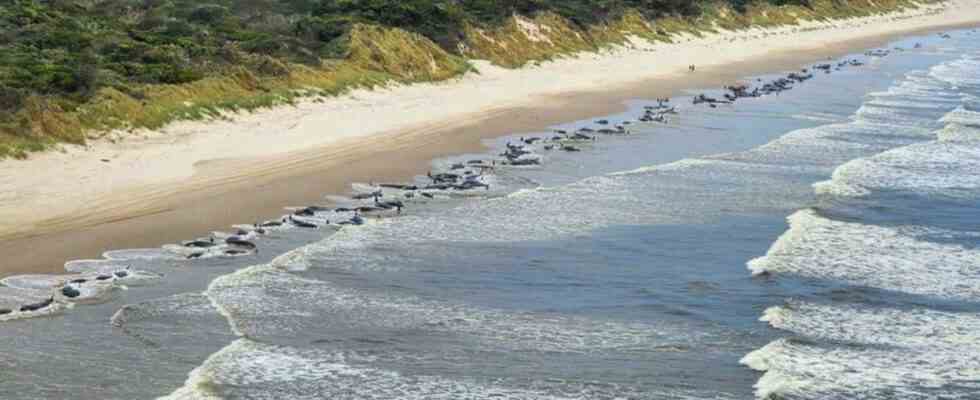mass stranding
Struggle for the lives of stranded whales in Tasmania
Hundreds of whales were stranded in remote Macquarie Bay in western Tasmania. photo
© Uncredited/Department of Natural Resources and Environment Tasmani/AP/dpa
Rescuers fight for the lives of stranded whales on Ocean Beach in Tasmania. Most have already died. And even those that are taken into deep water could soon be stranded again.
The day after 230 pilot whales were mass stranded in a bay on the Australian island of Tasmania, only a few dozen are reportedly alive.
After another five marine mammals died during the night, the emergency services counted only 35 living animals on Thursday morning (local time), said a spokesman for the authorities. Helpers were on duty to moisten the bodies of the marine mammals with buckets of water and wet towels. Australian media spoke of a “race against time”.
The pilot whales (also known as pilot whales) were stranded in remote Macquarie Bay on the west of the island on Wednesday. According to eyewitnesses, half of them were still alive. Exactly two years ago, 470 pilot whales were stranded in the same bay, 111 of them survived.
Most whales are completely washed up on the beach
The current situation is very complicated because most of the whales – unlike in 2020 – have been completely washed up on the beach, Brendon Clark from the “Tasmania Parks and Wildlife Service” told ABC. “Last time they were halfway in the water and had some buoyancy,” Clark explained. This time the rescue is therefore even more difficult.
“Unfortunately, the pilot whales’ probability of survival is low,” whale researcher Olaf Meynecke from Griffith University in Queensland told the German Press Agency. Even if the surviving whales are transported to the open sea, many may try to return to their stranded friends and family, he explained.
The emotional stress of the animals, which have developed extremely close bonds with one another, is very great. “Some animals will still make it, but the majority of them will perish,” he explained, adding: “For a cetacean scientist like me, this is one of the worst moments of my job.”
Enormous logistical challenge
With heavy equipment and boats, the emergency services want to try to transport the surviving whales several hundred meters into the sea, as Australian media reported. However, the logistical challenge is enormous: Ocean Beach, where most of the animals have washed ashore, is a 30-minute walk from the nearest parking lot.
Meanwhile, the timing of the stranding is not unusual: Pilot whales are at certain times – like now in the Australian spring and towards the end of winter – in large groups, explained whale researcher Meynecke. This increases the risk of mass stranding. “Some animals may be sick and stray into a bay with shallow water. Subgroups that the whales are friendly or related to will follow them – literally to the death.”
Report ABC

